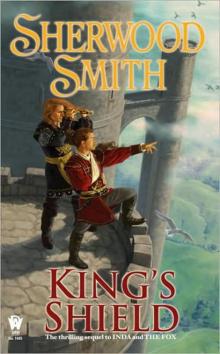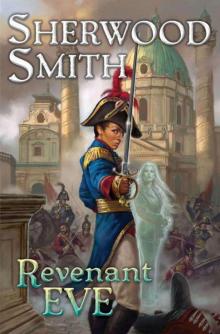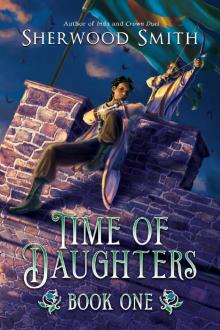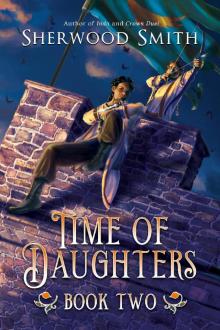- Home
- Sherwood Smith
Sasharia en Garde Page 8
Sasharia en Garde Read online
Page 8
“We need to get you safely to land,” Elva murmured, after the cook vanished back into her galley.
The mates’ wardroom was empty. Everyone had gone to their watch duties or else to rest for a later watch. But I was aware of the canvas doors running down the sides, dividing off the mates’ cubbies. (The rest of the crew slept forward and some below.)
“You don’t think we’re safe now?”
“Oh, I am. I think. I hope.” She lowered her voice, glancing at those canvas doors. “But what’s to stop him from ransoming you for a smacking sum from the king? Or for a pardon and other concessions?”
Ransom! I hadn’t thought of that. Uneasily I considered it. Then I said low-voiced, hoping the slap-thump of water against the hull and the creak of mast and deck would cover our conversation, “He has a price on his head, right?”
“That’s true.”
“So he risked his life to come inland to help you out, ahead of the king’s men, and he’s against Canary. Those are two points in his favor.”
She knuckled the sides of her forehead. “That’s what my brother says, too. But I think something’s missing. I feel like, oh I don’t know, we’re on the coast with a strange chart. The big landmarks are all there, but what about the little ones?”
I looked at her puckered brow, her unhappy posture, and wondered if Elva was a math mind. The navigation career sure pointed that way.
“Listen, if you find any reason to distrust Captain Hurricane, I’ll listen. But I do feel obliged to tell you that I’m going to make my own plans as soon as we reach land. That doesn’t include your brother’s mages or magisters, or whoever sent him.”
Elva flushed. “That’s fair.”
We finished our meal and dipped our dishes in the bucket set aside for them. I watched the brief flare of magic cleaning my plate as it hit the water, and I remembered the cleaning buckets from my childhood. It had actually been such homely little magics, and no grand and spectacular spells, that had caused me to ask my father to teach me. On this world no one had to wash and rinse dishes—or clothes, if you had a cleaning bucket or frame. And the cleaning frame not only cleaned your clothes, but your body as well, right to your teeth, when you stepped through. It felt like the snap of electricity all over you, leaving you feeling as if you’d scrubbed with a loofa and rubbed all over with a thick towel.
I stacked my dish on the waiting pile a moment before I heard a step behind me. A young woman as tall as me appeared from one of the little cabins. I ducked out of her way, murmuring a word of pardon.
She bent her head, giving me a quick, almost furtive look without meeting my eyes, and climbed with practiced speed up the ladder to the deck. I followed more slowly, trying to get the feel of climbing a ladder when the ship swings you out, then back, and bucks suddenly from side to side.
On deck I discovered yet more drills going on among those not on duty. This time it was personal combat.
The weather had changed dramatically while Elva and I were below. A heavy mist grayed the masts and the sails overhead, turning the blue sea to gray-green. It made the deck slippery, but that did not stop the practice on the forecastle, directly outside of our cabin, where most of the crew gathered round a clear space.
Devli sat on the rail along with several other young men. He’d accepted a bunk below in the crew’s quarters, and these were his messmates. That is, the fellows he shared a table with. The pirates seemed like sailors to me. Nobody was cursing and spitting, or teaching parrots naughty songs. In fact, I wasn’t sure if this world even had parrots, though I knew that many Earth animals, birds and other fauna as well as flora had come, or been brought, through.
Devli beckoned to his sister, who walked to the rail where he sat, her arms crossed. Next to the sailors, her uneasiness made her seem out of place.
A short girl with bright red hair tapped her sword point on Elva’s shoulder. “Want to join in?”
Elva jumped, and shook her head warily.
Her attitude seemed to puzzle the redhead, and I wondered if her feelings were hurt by Elva’s attitude. But she turned my way and said more tentatively, “Would you like to get in some practice?”
After years of dojos full of strangers, I was used to this situation. Thinking that rest, food, and a workout were the three things I needed most, and I’d gotten the first two, I said, “Sure, thanks.”
A big grin was my reward. “I’m Robin, second mate. Why don’t you grab yourself a weapon. You’ll get a turn anon.”
She indicated the weapons locker. It was an admirably neat arrangement that rolled back against one side of the half-deck wall and lashed into place. The locker held three rows of neatly stored steel weapons, ranging from light rapiers to very heavy flat swords of the sort infantry carry. There was one curve-tipped cavalry sword marked off with a red tie.
I picked out a dueling saber, buttoned on the end, and began warm-ups as I watched the two in the center.
It was immediately apparent that they were more enthusiastic than trained. The bout only last a few seconds. One dropped his sword. The watchers crowed and catcalled with good nature, then the pair recommenced. This bout lasted longer only because they circled two or three times, watching one another—but not well enough to actually spot openings.
The winner of that bout turned around. His eyes briefly met mine, and the fellow flushed. I wondered if I’d managed to come unbuttoned or unzipped anywhere. No, the sturdy shirt I’d borrowed was laced up to my collarbones, sashed with a plain berry-brown-dye sash. The drawstring of the deck trousers remained securely tied, so I wasn’t flashing underwear. My feet were bare, as I’d kicked off my sandals almost first thing on coming aboard.
An older, gray-haired man said, “You keep pickin’ the easy ones. Come on, let’s see you work up a bit of a sweat.” And he stepped up, swinging his sword from hand to hand.
More catcalls, and the gray-haired fellow promptly and gleefully trounced the younger, taller fellow. Then it was his turn to pick a partner, and he pointed straight at me. “Let’s see what your father taught you.”
“Well, he started teaching me, anyway.” I stepped into the ring of watchers. “I got most of my training elsewhere.” I felt self-conscious, but no more than one did during a sparring match for a belt test.
I didn’t say, because I thought it would sound arrogant, that I’d seen his own weaknesses when he fought the tall, young fellow from Devli’s mess, and so I knew where to get inside his guard as soon as he lunged at me in a feint.
I tapped the button against his chest, and he looked down, blue eyes wide in surprise. “Well! Try it again?”
I swept my sword up in salute. The second bout lasted longer. He had the edge on me with strength, but I had it on footwork, speed, and far-better training. Once again I tapped him, this time just above the collarbones, and a whoop went up from the watchers.
“Pick me! Pick me!”
“Hoo, how would you like to die?”
Laughter and more catcalls surrounded me as Zathdar and his two captains on the half-deck aft watched. A short, wiry man with waving dark red hair leaped over someone and confronted me, his slanty eyes slitted with laughter and his grin wicked. Like Zathdar, he wore a golden hoop in one ear. “Try me, Prin—ah—”
I’d forgotten the princess business. Was that why some of them stared at me so much? “Sasha will do.”
“Owl. First mate.” I saw a sort of family resemblance to Robin, and later found out they were cousins, though almost a generation apart in age.
“All right, Owl, bring it on!”
“Bring?” He looked around. “It? On?”
“Slang for have at it!”
As we squared up, whispers of bring it on went through the watchers. Owl attacked me and I closed out everything else.
I won that first one, only because I whipped a hook kick up and nailed his wrist after I dodged a lunge. The crew sent up an appreciative cheer, Owl flashed a grin, and we went at it again, this time fas
ter and harder. I was soon drenched with sweat, several times nearly losing. I recovered a heartbeat ahead of defeat, and then returning an attack which he parried, almost too late.
But finally he launched a complicated strike that I couldn’t deflect without straining my wrist. I was just enough off-balance to take the brunt of the hit in my hand and arm. I dropped my blade, wringing my stinging fingers. “Yi! Yi! Yi!”
“We’ll call that a draw.” Owl lowered his point to the deck. “Do you usually fight with gloves?”
“Yes,” I gasped. “And that’s something I’ll have to see to right away. But that was a win. It was as fair as my hook kick, right? All’s fair in war, but not in dueling? Is that true here?”
A silence fell, at first I thought because of my question, but I saw that Zathdar had joined the circle. “More or less. Depends where you are.” Zathdar swung his sword experimentally.
Someone returned my blade. Others made room for me to sit on the deck in the first row.
Zathdar and Owl squared up, and began a long bout that was sheer pleasure to watch.
As they traded feints, Elva slid up next to me. “I think you should thump him.” She jerked her chin toward Zathdar. “Do him some good.”
“Nope,” I said, after a flurry so fast I nearly couldn’t follow it. Zathdar staggered back, Owl’s sword flew, and he rolled on the deck. The sword was caught in midair by the tall, blond young woman I’d seen below. She had a strong face, with a Kirk Douglas chin. She returned Owl’s blade as she said to Zathdar in an oddly shy manner, “That trick. How do you do it?”
“On your feet, Owl. Move through it slowly.”
Owl scrambled to his feet and took his sword in hand. “I pressed inside like this.” He made a slo-mo lunge.
“And I blocked here, using my shoulder to blind him.” Zathdar whipped his sword in a tight circle, shifting his weight as he came out of the turn with his blade low.
“I saw it almost too late, blocked—”
The two reenacted the exchange, their method recalling good bouts from my dojo days. Most of the crew intently watched each pass.
When they were done, people shifted about, and again Elva said, “Go on.”
I shook my head. “He’s better.”
Elva made a noise of disgust.
Zathdar said in a quiet voice with considerable amusement, “She’s right, you know. Not by much, though. It’s those upward blocks.”
So he’d heard. While I shut out everything when I engage in a bout, he was aware of everything around him. This is the difference between a lifetime of just dojo-floor practice and a lifetime of using what you learned, I thought. But aloud I only said to Elva’s flushed face, “We don’t hit above the collarbones in competition fencing, which is why I’m unused to blocking upward.”
“Nor do you defend against a mounted attacker, is my guess,” Zathdar observed.
“True enough. Plus he’s a tad taller, and definitely bigger through the upper body than I, so he’s got a longer reach. That makes a difference even when the training is the same, but his is better, I think.”
“Practical experience.” He gestured with a mocking air of apology and flashed a grin. “However. As this is supposed to be learning, want to show them some tricks of the trade from the other world?”
“All right.” I scrambled to my feet. “But I saw those hits you scored on Owl. Anyone have a pair of gloves I can borrow?”
Several women offered, but their hands were all smaller than mine. Only the blonde did not offer, though she was my size. A gangly fellow passed me his, and they fit perfectly.
So Zathdar and I squared off, and the entire crew fell silent, even those in the tops, who leaned out to watch.
We began by making a few passes to test reflexes and strength. On the former we were roughly equal, but he had the edge on the latter. Also, his drill hadn’t been confined to the rules, and while I’d seen opportunities to use street-fighting techniques with slower fighters, he was too well practiced high, low, behind—all the places sport fencing forbade. He seemed to be holding back. He was demonstrating. Gradually we sped up, until my arm felt like string and my eyes burned with sweat, and then came the inevitable tap of the point lightly in the hollow of my collarbones.
The crew burst into cheers. “That was fantastic,” I exclaimed and flourished a salute.
“Want another?” he offered.
“Nope. I can already tell I’m going to be sore and stiff by nightfall. I haven’t had a workout that good in much too long.”
He turned away to select another volunteer as I returned the gloves to their owner, apologizing for their dampness. At least there was a cleaning frame below, I thought, sitting gratefully.
We observed two more sessions before the watch bell rang. In the general movement Zathdar appeared at my side. “Come to the cabin?”
“All right.” I swung to my feet. “I have some questions.”
“I thought you might.” He twitched his eyebrows at me before leading the way. I followed that silk, no less blinding for being sodden from the increasing mist, as around us the day watches changed, people talking and laughing, the armorer keeping up a running stream of insults if weapons were not wiped down and put back in the racks to his exact specifications.
The other two captains had long since rowed back to their own ships to oversee their own combat sessions. Zathdar waved me into the cabin, and I ducked my head absently as I passed inside. This time I noticed things I hadn’t before: the neatly made bunk, and the coverlet dyed various shades of green from pale silver to deep forest. Green was green, but somehow the thing radiated masculine vibes.
Above the bunk at the head end, someone had built shelves, which were crammed with handmade books. Next to the shelves, a silverwork crane taking flight rested on its own little shelf, jury rigged between a bulkhead and the hull. Stacked next to that, in eye-pleasing array, a series of maps—Khanerenth, Sartor, Colend. Chwahirsland. Some of the western lands that I did not recognize.
Above the foot of the bunk, a shelf held an exquisitely rendered tiny carving of a tree, the bark indicated by the grain of the wood, each branch curving up into impossibly tiny and intricate twigs, attached to which were tiny five-point leaves made of green silk.
“I didn’t steal that,” Zathdar said from right behind me.
I jumped and whirled around, unsettled, as if I’d been caught prying through someone’s personal things.
Zathdar did not glance my way. He shifted around me, the crimson silk of his shirt shimmering in the diffuse light from the stern windows. The fabric shaped smoothly over the contours of shoulder and arm as he reached up and carefully took the carved tree from its shelf. “There’s a spell that goes with it. You say it, and the leaves rustle. You can listen to them. Very pleasant, I assure you, if you happen to be caught windless out in the deeps, the ship wallowing and no breath of air.”
He faced me, holding out the tree in both hands. I shook my head. “It’s too delicate. I’m afraid I’ll break it.”
He turned away again and I whooshed out my breath, trying to find the cause of my absurd reaction. This was a captain’s cabin, and little as I knew of ship matters, I did know it hardly constituted personal space, not unless the door was shut (it was not) and the scuttles all closed (they weren’t).
He leaned a knee on the bunk and settled the tree just right, the fringes of his bandana swinging against his cheekbone. The books, the green coverlet, the precise slant of the handwriting on those maps, the tree and the silver bird. I’d seen all these the day previous, but then they’d been just things, scarcely noticeable. Now they were personal.
Rain began hissing on the deck overhead, which somehow made the space feel even more cramped. Though the rain made a steady thrum, I could hear the sound of his breathing. “Did you steal the ship?” I blushed uncomfortably. I hadn’t meant to say that at all.
He grinned. “It’s tradition, how pirate ships change hands. But pause and think
. Where would you go if you wanted to purchase one? To a kingdom shipyard, asking the yardmaster if he happens to have any pirate ships for sale—very fast, preferably with at least one false hold? No. When navies take pirates, they tend to work the ships into their fleet, captains squabbling over who gets command. Then, er, they tend to be spotted and cut out again by people like me.”
“You could have one built.”
“But it can take years. If one has enough money. Easier to catch ’em, I’m afraid.”
“You said pirate ships. But you claim to be a privateer. How do privateers get their ships?” I asked.
“Steal ’em from pirates.” He tapped the earring glinting against his jawline. A ruby stone glittered on it. “You wear a hoop after you’ve survived a battle, and rubies when you’ve defeated a real pirate. While that won’t scare off other pirates—little does—the ruby tends to ward off the would-bes. Saves effort.”
He twiddled his fingers, giving me a wry glance. I laughed, as I was meant to. The moment made me feel slightly less unsettled, but far more aware of him. Skilled sword-swingers I had known in plenty during my fencing years, and they had come and gone leaving me unmoved. But a guy with a sense of humor?
“So.” He thumped his elbows on the table, hands flicking open. “Before I get to my suggestion, what do you wish to do?”
“I’d like to be set on land as soon as possible, thank you.”
“Even though by now there is a price on your head?”
“There is? But I didn’t do anything!”
“It’s not what you’ve done, it’s who you are.” He gave me an apologetic smile. “I guess what follows is what they’re afraid you’ll do.”
Annoyance flushed through me; good, much better, much safer than interest. “Arrested for a crime someone else premeditates on my behalf? That’s got to be a new one even for the local Dark Lord.”
“Dark Lord? King Canardan is a king, not a lord. He also has red hair. Or would the ‘dark’ refer to his clothing? Except that he is reputed to dress well, and the mode, everyone tells me, is light colors. Not that I follow the fashions, as you can see.”

 Inda
Inda Danse De La Folie
Danse De La Folie King's Shield
King's Shield Whispered Magics
Whispered Magics Fleeing Peace
Fleeing Peace Barefoot Pirate
Barefoot Pirate Crown Duel
Crown Duel Mearsies Heili Bounces Back
Mearsies Heili Bounces Back Commando Bats
Commando Bats A Stranger to Command
A Stranger to Command Lhind the Spy
Lhind the Spy The Spy Princess
The Spy Princess Blood Spirits
Blood Spirits Sasharia en Garde
Sasharia en Garde Lhind the Thief
Lhind the Thief Paradise Drift
Paradise Drift Banner of the Damned
Banner of the Damned The Trouble With Kings
The Trouble With Kings Poor World
Poor World Treason's Shore
Treason's Shore Wren Journeymage
Wren Journeymage A Posse of Princesses
A Posse of Princesses Revenant Eve
Revenant Eve Once a Princess
Once a Princess Time of Daughters I
Time of Daughters I Rondo Allegro
Rondo Allegro Coronets and Steel
Coronets and Steel Over the Sea
Over the Sea Senrid
Senrid Hunt Across Worlds
Hunt Across Worlds A Sword Named Truth
A Sword Named Truth The Fox
The Fox Twice a Prince
Twice a Prince Fair Winds and Homeward Sail: Sophy Croft's Story
Fair Winds and Homeward Sail: Sophy Croft's Story Time of Daughters II
Time of Daughters II The Rifter's Covenant
The Rifter's Covenant The Phoenix in Flight
The Phoenix in Flight Stranger
Stranger The Thrones of Kronos
The Thrones of Kronos A Prison Unsought
A Prison Unsought Twice a Prince: Sasharia En Garde Book 2
Twice a Prince: Sasharia En Garde Book 2